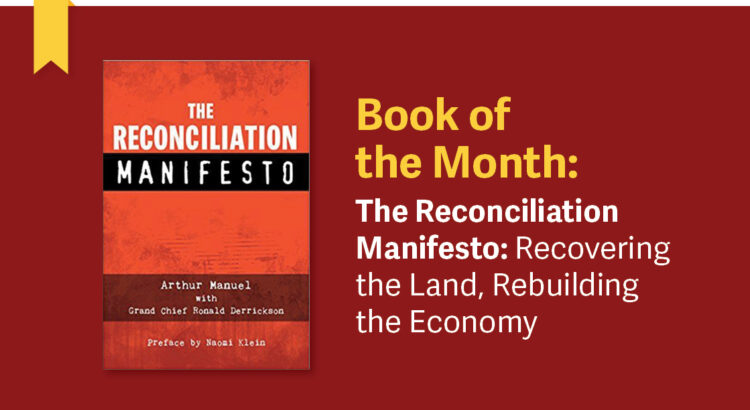The Reconciliation Manifesto: Recovering the Land, Rebuilding the Economy (2017)
By Arthur Manuel and Grand Chief Ronald Derrickson
“Today, as Indigenous peoples, we confront our greatest hopes and our greatest fears. We see a new and very public openness in Canada toward us and our rights, and lofty talk of reconciliation and a shared path into the future. But in the shadows behind the scenes, the negotiations to force us to surrender our Aboriginal title continue apace. In fact, they may even be accelerating.”
June is National Indigenous History Month, a month that the Canadian government says is a “time to honour the stories, achievements and resilience of Indigenous Peoples.” It should also be a time to deepen our understanding of the Indigenous struggle for land and self-determination. In The Reconciliation Manifesto: Recovering the Land, Rebuilding the Economy (2017), Arthur Manuel calls the government’s motivations for reconciliation into question. He cuts through the tepid proclamations and acts, designated holidays, and month of “celebration” to the unresolved heart of the Indigenous struggle in Canada, and begins to point to what we can all do about it.
Manuel was a Secwepemc and Ktunaxa political leader, highly respected Indigenous grassroots activist, and political strategist whose entire life was committed to Indigenous liberation. He championed his own Secwepemc people’s fight as strongly as he sought to make meaningful connections between Indigenous nations across Turtle Island, and across the world.
As educators, it is our responsibility to know the truth of history and the colonial present so that we can engage beyond the buzzwords of reconciliation and Indigenization. Manuel’s compelling and accessible book, rooted in personal stories from his family and life, is a great place to start. As he writes, hope is on the horizon in “the gradual dawning of awareness among ordinary Canadians that things are not right and things have to change.”
—Natalie Knight
You can find this book in our TCDC library. Visit us on the second floor of the C-Building at C201 or email us at tcdc@langara.ca

